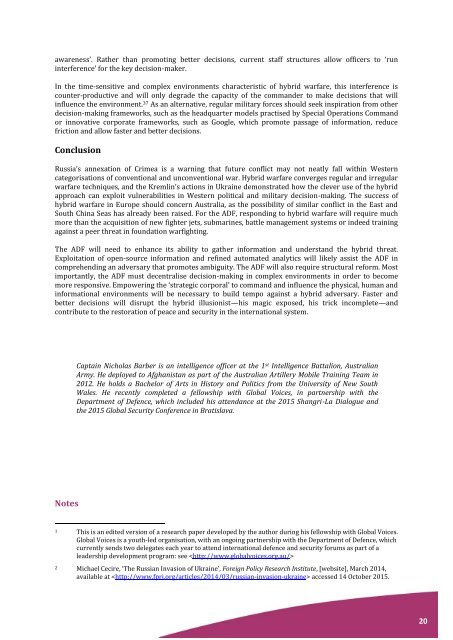Issue No 198 2015
198 2015 Nov_Dec
198 2015 Nov_Dec
Create successful ePaper yourself
Turn your PDF publications into a flip-book with our unique Google optimized e-Paper software.
awareness’. Rather than promoting better decisions, current staff structures allow officers to ‘run<br />
interference’ for the key decision-maker.<br />
In the time-sensitive and complex environments characteristic of hybrid warfare, this interference is<br />
counter-productive and will only degrade the capacity of the commander to make decisions that will<br />
influence the environment. 37 As an alternative, regular military forces should seek inspiration from other<br />
decision-making frameworks, such as the headquarter models practised by Special Operations Command<br />
or innovative corporate frameworks, such as Google, which promote passage of information, reduce<br />
friction and allow faster and better decisions.<br />
Conclusion<br />
Russia’s annexation of Crimea is a warning that future conflict may not neatly fall within Western<br />
categorisations of conventional and unconventional war. Hybrid warfare converges regular and irregular<br />
warfare techniques, and the Kremlin’s actions in Ukraine demonstrated how the clever use of the hybrid<br />
approach can exploit vulnerabilities in Western political and military decision-making. The success of<br />
hybrid warfare in Europe should concern Australia, as the possibility of similar conflict in the East and<br />
South China Seas has already been raised. For the ADF, responding to hybrid warfare will require much<br />
more than the acquisition of new fighter jets, submarines, battle management systems or indeed training<br />
against a peer threat in foundation warfighting.<br />
The ADF will need to enhance its ability to gather information and understand the hybrid threat.<br />
Exploitation of open-source information and refined automated analytics will likely assist the ADF in<br />
comprehending an adversary that promotes ambiguity. The ADF will also require structural reform. Most<br />
importantly, the ADF must decentralise decision-making in complex environments in order to become<br />
more responsive. Empowering the ‘strategic corporal’ to command and influence the physical, human and<br />
informational environments will be necessary to build tempo against a hybrid adversary. Faster and<br />
better decisions will disrupt the hybrid illusionist—his magic exposed, his trick incomplete—and<br />
contribute to the restoration of peace and security in the international system.<br />
Captain Nicholas Barber is an intelligence officer at the 1 st Intelligence Battalion, Australian<br />
Army. He deployed to Afghanistan as part of the Australian Artillery Mobile Training Team in<br />
2012. He holds a Bachelor of Arts in History and Politics from the University of New South<br />
Wales. He recently completed a fellowship with Global Voices, in partnership with the<br />
Department of Defence, which included his attendance at the <strong>2015</strong> Shangri-La Dialogue and<br />
the <strong>2015</strong> Global Security Conference in Bratislava.<br />
<strong>No</strong>tes<br />
1 This is an edited version of a research paper developed by the author during his fellowship with Global Voices.<br />
Global Voices is a youth-led organisation, with an ongoing partnership with the Department of Defence, which<br />
currently sends two delegates each year to attend international defence and security forums as part of a<br />
leadership development program: see <br />
2 Michael Cecire, ‘The Russian Invasion of Ukraine’, Foreign Policy Research Institute, [website], March 2014,<br />
available at accessed 14 October <strong>2015</strong>.<br />
20


